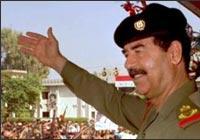Saddam trial hears two witnesses without any lawyers present in courtroom
Two prosecution witnesses in the Saddam Hussein trial testified Thursday about torture at the hands of his security forces, but the former Iraqi leader and his co-defendants did not attend because they either boycotted the session or were barred from court.

Saddam and the other defendants watched the proceedings by a video hookup from elsewhere in the building, a Western diplomat said, speaking on condition of anonymity because of the sensitivity of the trial.
After an unusually short session of less than two hours, chief judge Raouf Abdel-Rahman adjourned the trial for nearly two weeks until Feb. 13, apparently to allow time to try to resolve the standoff with the defense.
The boycott by defendants and their entire defense team has raised concerns over the credibility of a landmark trial that U.S. and Iraqi officials hoped would help Iraqis move beyond the sharp divisions left by the Saddam era. The video hookup appeared to be a stopgap measure to get around the problem, at least temporarily.
The former Iraqi leader and four of the other defendants have boycotted the trial since Sunday, when their defense team walked out of court. Abdel-Rahman barred the remaining three defendants from Thursday's session for creating "chaos" outside the court. He did not elaborate.
The eight defendants' chairs stood empty in a pen in front of the bench, as the judge ordered the proceedings to continue. The court heard two witnesses, both testifying from behind a curtain to hide their identities.
Saddam and his co-defendants are on trial for the killing of more than 140 Shiites in a crackdown after the 1982 attempt on the former ruler's life in Dujail, north of Baghdad . They face death by hanging if convicted.
The first witness to take the stand Thursday said he was 12 when he was arrested in Dujail, then tortured by interrogators who hung him by the hands and gave him electric shocks. He told the court his sister was stripped naked and beaten in front of him.
"People returning (to their cells) from torture sessions could not walk for days. We had to carry them to the toilet," he said.
He said he saw his dead brother in a line of eight bodies in Dujail the day after the assassination attempt on Saddam and watched his father being beaten by a man he was later told was Barzan Ibrahim, the No. 2 defendant in the trial after Saddam.
The other witness told the court that Ibrahim tortured him in prison after he was arrested in the crackdown.
The witness said he was taken to the Baghdad headquarters of the Mukhabarat intelligence agency, where interrogators forced him to strip and hung him from his feet. They beat him with hoses and applied electric shocks to him, including to "sensitive parts" of his body, he said.
At one point, Ibrahim entered the interrogation along with two men in civilian clothing, the witness said. The former intelligence chief asked one of the men to light a cigarette for him, and Ibrahim put it out on the witness's head, the witness told the court.
The Western diplomat said Saddam met for 45 minutes with his court-appointed lawyer, whom he has refused to recognize. The defendants were given the chance to submit questions through their attorneys, but the diplomat would not comment whether any did so.
The defense team has said it will not participate in the trial until Abdel-Rahman is removed, alleging he is biased against Saddam. Abdel-Rahman appointed new defense attorneys but Saddam and the four other defendants have rejected the new lawyers and refused to attend the trial until their original ones are restored.
The remaining three defendants attended a session Wednesday, which was the smoothest day of testimony to date.
The trial has been plagued by the assassination of two defense attorneys, delays, arguments, insults and outbursts by Saddam and Ibrahim. Abdel-Rahman was brought in as chief judge after his predecessor resigned amid criticism he was not controlling the proceedings.
The defense team accuses Abdel-Rahman, a Kurd, of having a "personal feud" with Saddam because the judge was born in Halabja, a Kurdish village hit by a poison gas attack allegedly ordered by Saddam in 1988. Some 5,000 Kurds were killed in that attack, including several of Abdel-Rahman's relatives.
Saddam's original chief attorney, Khaled al-Dulaimi, also claimed that Saddam's regime tried Abdel-Rahman in absentia and sentenced him to life in prison in 1977. He said the judge was a member of a Kurdish party that was opposed to Saddam and so "holds political animosity with the defendant", reports the AP.
D.M.
Subscribe to Pravda.Ru Telegram channel, Facebook, RSS!


